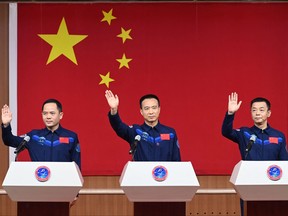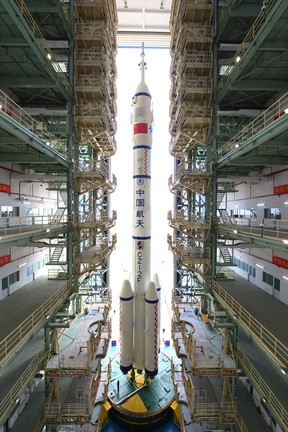
BEIJING — China sent a spacecraft carrying three astronauts to its space station for the first in-orbit crew rotation in Chinese space history, launching operation of the second inhabited outpost in low-earth orbit after the NASA-led International Space Station.
The spacecraft Shenzhou-15, or “Divine Vessel,” and its three passengers lifted off atop a Long March-2F rocket from the Jiuquan Satellite Launch Centre at 11:08 p.m. (1508 GMT) on Tuesday amid sub-freezing temperatures in the Gobi Desert in northwest China, according to state television.
As the Canadian national soccer teams head to their respective FIFA World Cups, Derek Van Diest is on the scene to cover all the action. Expect expert insights and analysis in your inbox daily throughout the tournaments, and weekly on Thursdays for the rest of the season.
Thanks for signing up!
A welcome email is on its way. If you don't see it, please check your junk folder.
The next issue of Corner Kicks with Derek Van Diest will soon be in your inbox.
Shenzhou-15 was the last of 11 missions, including three prior crewed missions, that began in April 2021 needed to assemble the “Celestial Palace,” as the multi-module station is known in Chinese.
The trio will take over from the Shenzhou-14 crew who arrived in early June. The previous crew members are expected to return to Earth in early December after a one-week handover that will also establish the station’s ability to temporarily sustain six astronauts, another record for China’s space program.
The space outpost took on its current “T” shape in November with the arrival of the last of three cylindrical modules.

The station has a designed lifespan of at least a decade, with resident astronauts expected to conduct over 1,000 scientific experiments – from studying how plants adapt in space to how fluids behave in microgravity.
The “Celestial Palace” was the culmination of nearly two decades of Chinese crewed missions to space. China’s manned space flights began in 2003 when a former fighter pilot, Yang Liwei, was sent into orbit in a small bronze-colored capsule, the Shenzhou-5, and became China’s first man in space and an instant hero cheered by millions at home.
The space station was also an emblem of China’s growing clout and confidence in its space endeavors and a challenger to the United States in the domain, after being isolated from the NASA-led ISS and banned by U.S. law from any collaboration, direct or indirect, with the U.S. space agency.
The Shenzhou-15 mission, during which its crew will live and work on the space station for six months, also offered the nation a rare moment to celebrate, at a time of widespread unhappiness over China’s stifling zero-COVID policies while its economy hits the brakes amid uncertainties at home and abroad.
“Long live the motherland!” many Chinese netizens wrote on social media.


